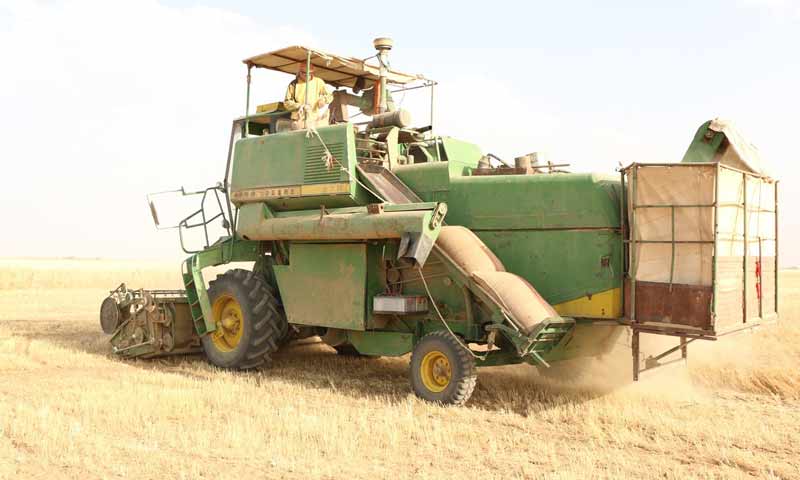Enab Baladi – Raqqa
With the money, he had saved for a surgical operation, Turk al-Jasim, a farmer in the western countryside of Raqqa province, bought the whole wheat seeds to cultivate his land this year.
Al-Jasim lost his 2019 crop due to the fires. In addition, he did not get any financial compensation for his losses because he was not in the region, nor did he get free water to irrigate his crops.
With the advent of the new planting season, he had to pay cash to cultivate his land, and borrow some money from a relative to buy fertilizers as well.
The farmers, who depend on cultivating their lands with wheat, in the city of Raqqa have experienced several difficulties to make the cultivation season successful for this year.
The Kurdish-led Autonomous Administration in the north-east of Syria issued a decision in 2019, to compensate farmers affected by major fires that ravaged their agricultural crops for the previous agricultural season in the areas under its control.
Each farmer will be provided with seeds free of charge from the distribution centers of the Economic and Agriculture Authority.
The farmers, who depend on growing their lands with wheat, in the city of Raqqa, are faced with many challenges to prepare for a successful planting season this year.
Difficulties in acquiring seed
The greatest suffering of farmers and peasants’ was to obtain wheat seeds at the beginning of the current season, as monitored by Enab Baladi.
Some had to buy their seeds from merchants working in the markets of the province while others had to buy from the Kurdish-led Autuonmos Administration, which is controlling the region.
After the fertilizers were secured and applied after planting the seeds, it became difficult to provide water supply for irrigated lands due to a decision of the “Committee of Agriculture in the Raqqa Civil Council” that obliges farmers to pay money on each dunum of land, in exchange for access to water.
The committee also imposed on the farmers for the current season an amount of 1,500 Syrian Pounds (SYP- 0.8 USD) per dunum. Plus, the farmer must wait until all peasants and farmers pay for their lands, then the committee operates the irrigation network in the area.
Borrowing money for watering lands
The agricultural lands in the western countryside of Raqqa are running dry, especially those located in the Mazraat al-Rasheed area, with the problems in the irrigation network in the region and the difficulty in obtaining irrigation water. Furthermore, farmers live in poor conditions, because their crops in 2019 were burned, and many farmers were forced to borrow money from their acquaintances and relatives to pay the “irrigation fee.”
Unprecedented fires
With the end of the harvest season, the farmers sell their crops and once they receive the money, they buy the basic needs of their families, including household supplies, items, food, and clothes as well as pay the dues they have to the grocers during the winter, according to what the farmer, Muhammad al-Eid, from the city of Raqqa, told Enab Baladi.
The farmers’ expectations of good returns of their crops were not met for the current year, as the harvest date approached, fires broke out in several areas of the governorates of Raqqa, al-Hasakeh, and Deir Ezzor, causing damage to wheat and barley crops.
With the absence of official figures on farmers’ losses and material damage, it is estimated that the fires ravaged thousands of dunums of wheat and barley fields, within the areas controlled by the “Syrian Democratic Forces”(SDF) and the Syrian regime forces.
Resentment because of the procurement prices
After the completion of harvesting crops, the procurement price designated by the “ Autonomous Administration” for the grain crop at a value of 225 SYP per kilogram (0.12 US) created concerns among farmers. They consider it very low, according to what was monitored by Enab Baladi from the opinions of some farmers
Days after making the first pricing decision, the “administration” raised the price to 315 SYP (0.17 USD), which the farmers considered “somewhat fair.”
Then, the “administration” decided to postpone the determination of the purchase price of farmers’ grain crops until the Syrian currency is stabilized, due to the continuous decline in its value against foreign currencies.

